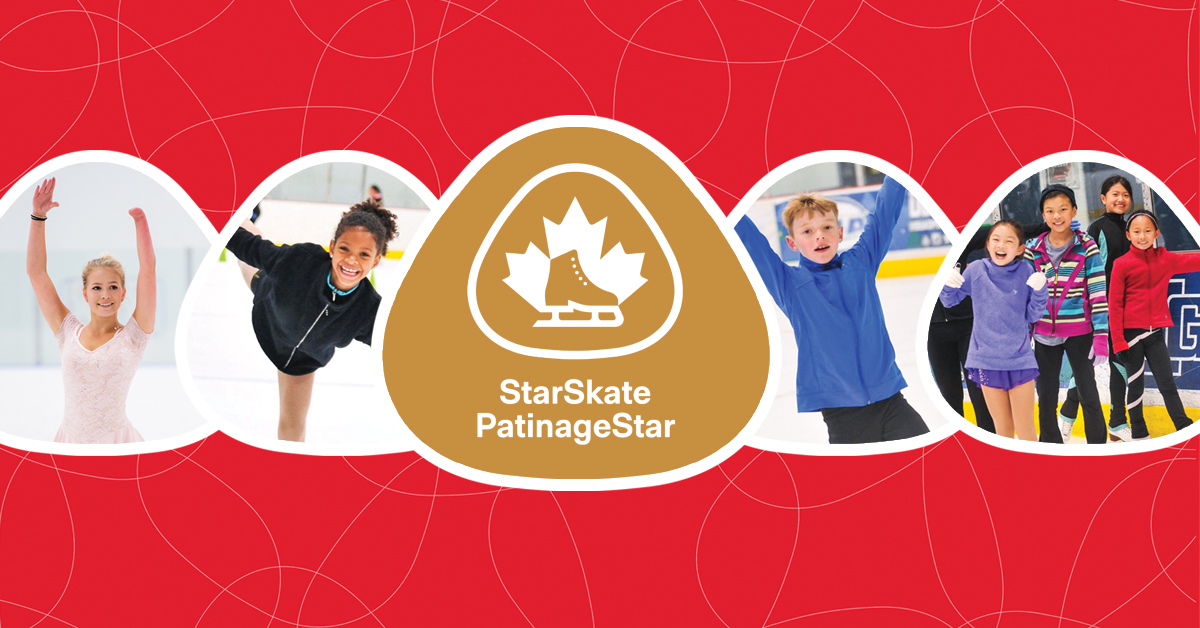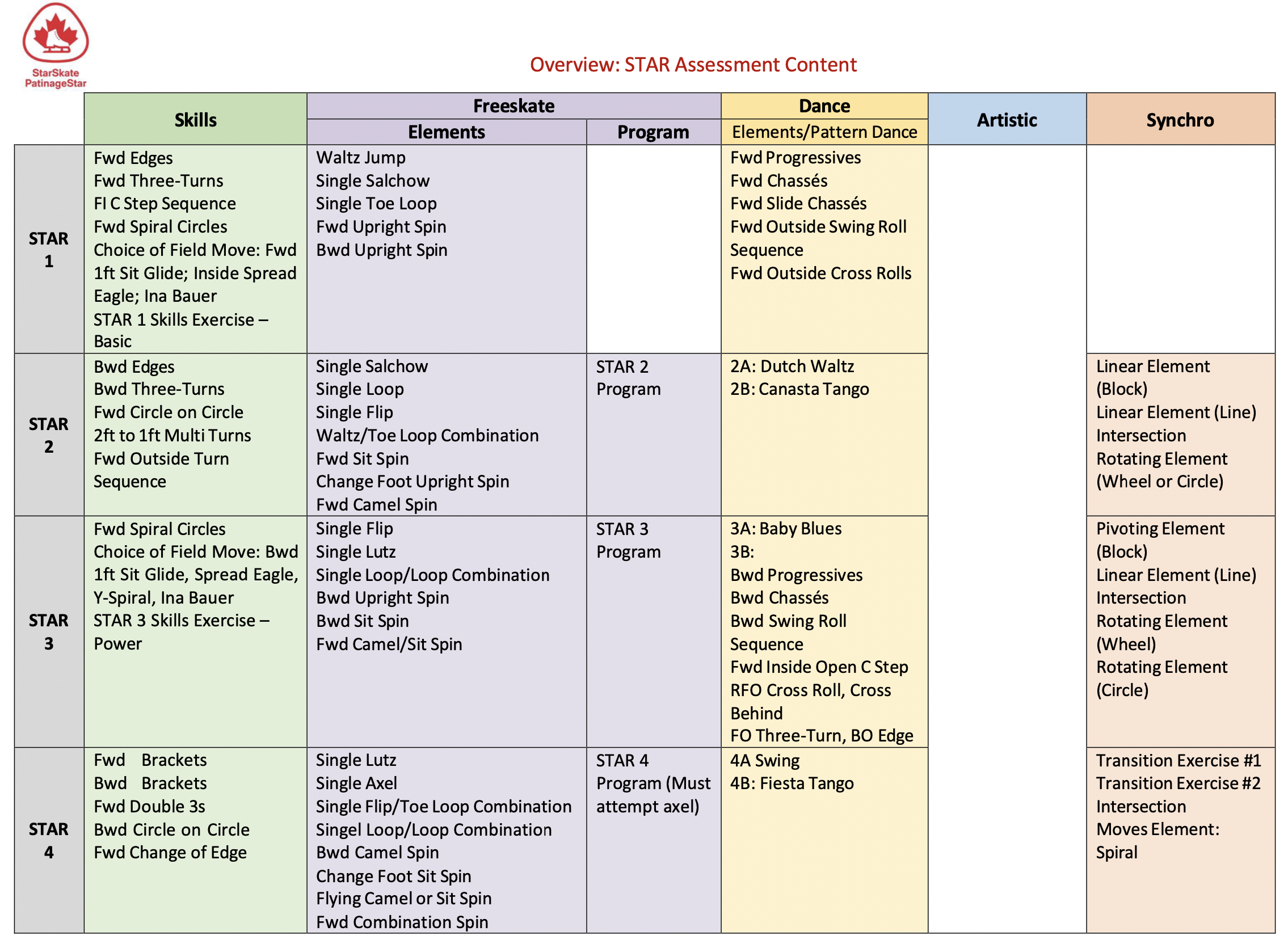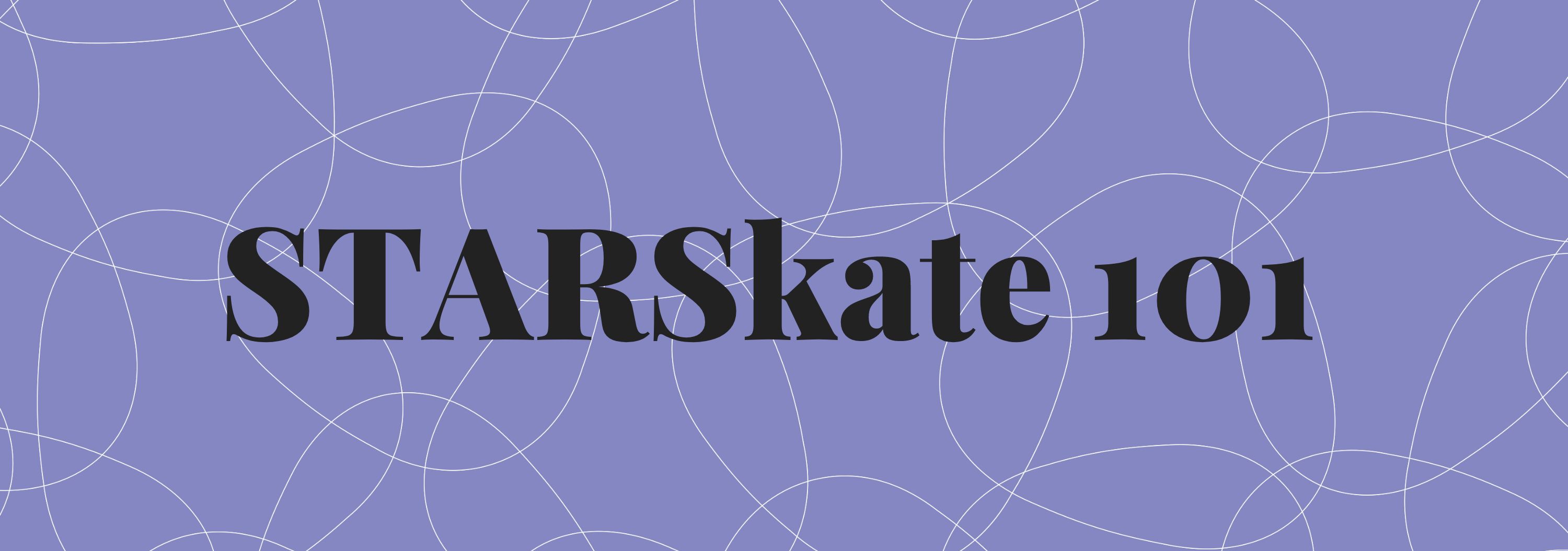
Skills, Tests, Achievement, Recognition – this is what STARSkate is all about!
Led by NCCP-certified Skate Canada coaches, the STAR 1-5 curriculum is Canada’s premier figure skating program. It lays the groundwork for future champions in singles, pairs, ice dance, and synchronized skating by introducing participants to all the figure skating essentials. We welcome skaters of all ages, including adaptive skaters who have met the required skill development level. All students must have completed CanSkate Stage 6 or an equivalent to enroll.
STAR 6-Gold is an assessment and event framework program designed for skaters who have completed the STAR 1-5 curriculum. It pushes your skills to the next level, building on what you’ve already learned while introducing exciting advanced figure skating elements.
The STARSkate program consists of figure skating skills in five areas – Skating Skills, Ice Dance, FreeSkate, Artistic and Synchro. Skaters progress through each area from STAR 1-Gold:
Beginner Level Assessment
- Star 1-5 Skills
- Star 1-5 Dance
- Star 1-5 Free Skate
- Star 5 Artistic
- Star 2-4 Synchro
All Star 1-5 levels are assessed by a coach.
Intermediate Level Assessments
- Star 6-8 Skills
- Star 6-8 Dance
- Star 6-8 Free Skate
- Star 7 Artistic
Senior Level Assessments
- Star 9, 10 & Gold Skills
- Star 9, 10, Gold & Diamond Dance
- Star 9, 10 & Gold Free Skate
- Star 9 & Gold Artistic
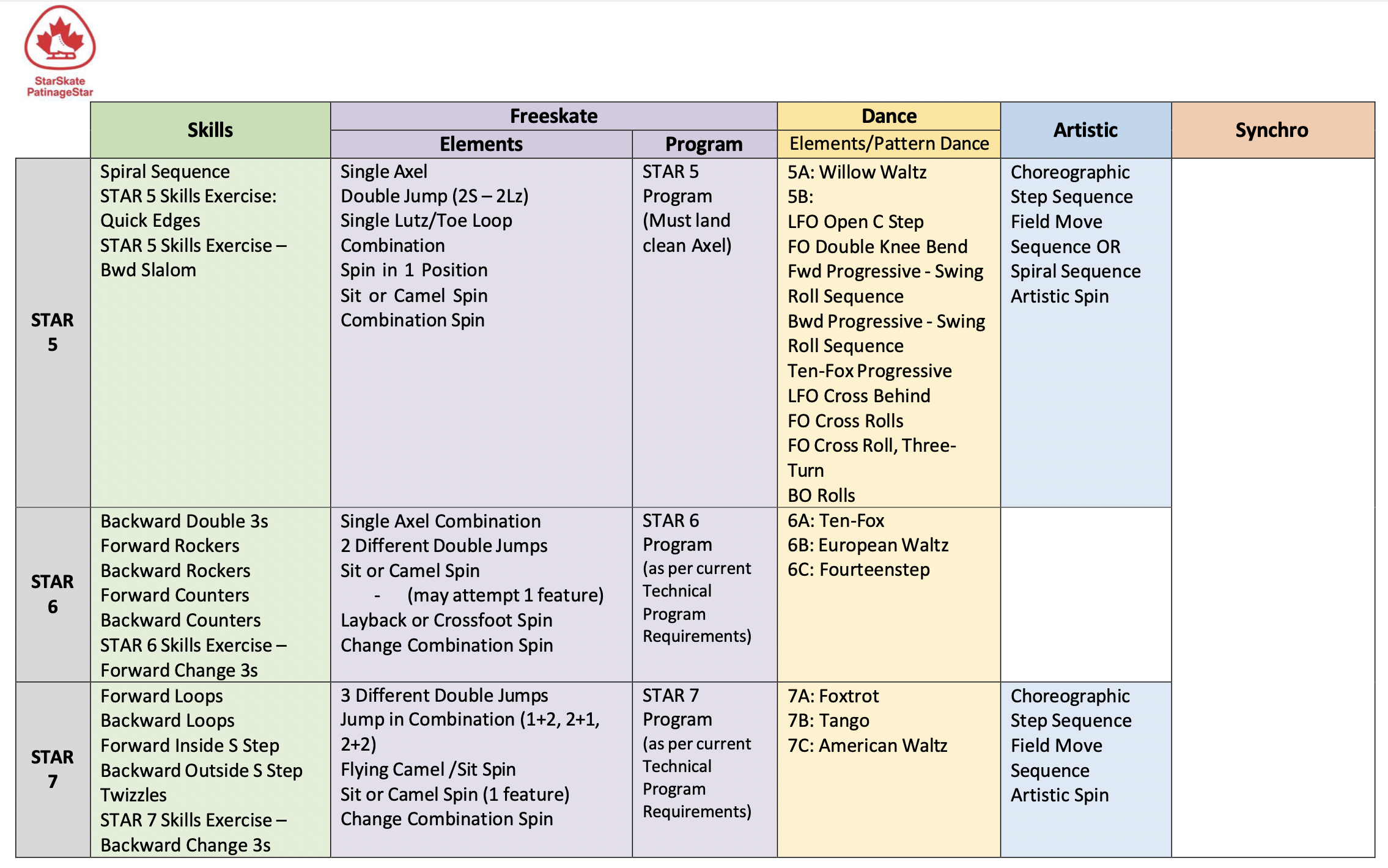
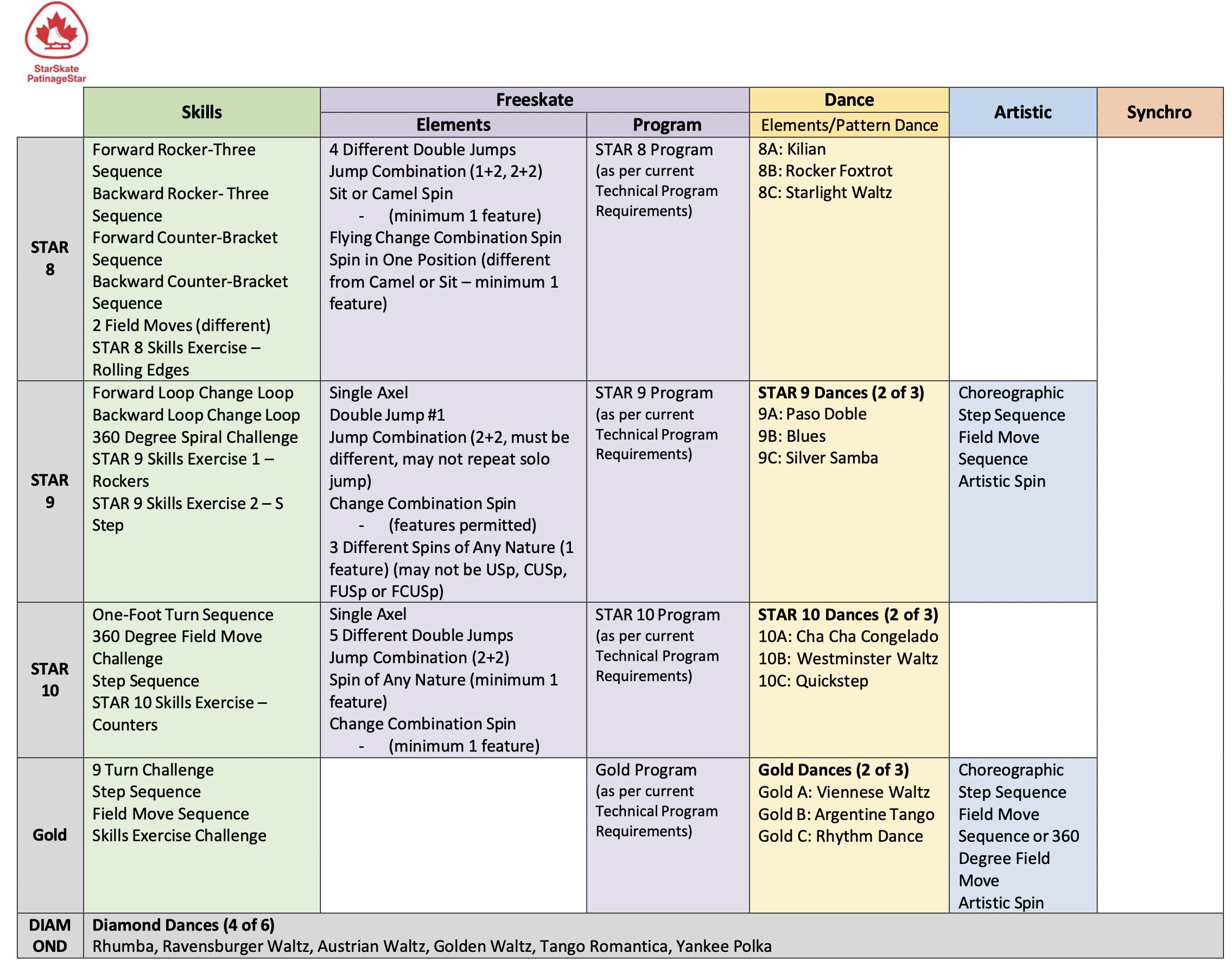
Skills are a combination of fundamental skating movements, executed on a pattern and skated solo. The basic components of all disciplines of figure skating are incorporated into the program. The movements are derived from former compulsory figures, free skating and ice dance. The objective of the Skills program is mastery of the basic fundamentals of skating – edge quality, control, power and speed.
All Skills assessments STAR 1-Gold will be assessed by Coach Rhys
There are 11 Skills assessments in the StarSkate program:
- Star 1
- Star 2
- Star 3
- Star 4
- Star 5
- Star 6
- Star 7
- Star 8
- Star 9
- Star 10
- Gold
[Back to Top]
Ice Dance
Ice Dance consists of 12 levels of assessments. The Dance assessment program teaches timing, musicality, rhythm interpretation, structure as well as basic skating skills such as edges, flow, control and unison (if partnered). The dances in the StarSkate Program can be tried in any order but a candidate must pass the required number of dances in a dance assessment before proceeding to the next level. Starting in STAR 6, skaters will be required to attend assessment days to test their dances in front of a qualified judge.
There are 24 Dance Assessments and/or an additional 6 in the STARSkate program:
- Star 1
- Star 2A & 2B
- Star 3A & 3B
- Star 4A & 4B
- Star 5A & 5B
- Star 6A, 6B & 6C
- Star 7A, 7B & 7C
- Star 8A, 8B & 8C
- Star 9A, 9B or 9C
- Star 10A, 10B or 10C
- Gold A, Gold B or Gold C
- 6 Diamond Dances optional
[Back to Top]
Freeskate consists of the execution of jumps, spins, footwork, field movements and stroking, either in isolation or performed in sequence to music. Starting in STAR 2 skaters will get their first program, this is an exciting time for skaters! The coach will select a few level appropriate music options for skaters to select from, it is important that skater's are able to skate to music they like but also appropriate for their skating ability. Parents are welcome to give suggestions but the final decision will be with the skater and coach. Once the music is selected the coach will "cut" the music to the correct time limit. There is a cost for music editing dependent on the length, for a digital copy and for USB if required. Invoices will be sent directly to you. Skaters will be able to go to competitions at their FreeSkate level, for a list of current competitions available check here!
There are 20 Freeskate assessments in the StarSkate Program:
- Star 1 - Elements
- Star 2 - Elements & Program
- Star 3 - Elements & Program
- Star 4 - Elements & Program
- Star 5 - Elements & Program
- Star 6 - Elements & Program
- Star 7 - Elements & Program
- Star 8 - Elements & Program
- Star 9 - Elements & Program
- Star 10 - Elements & Program
- Gold - Program
[Back to Top]
Artistic
The focus of the Artistic discipline is the development of program components, musical movement and creativity. Artistic combines skating aspects such as turns, edges and field moves, with creative spins and the ability to project emotion and artistry. The aspects developed through Artistic assessments benefit every discipline in skating. This is an additional program for skaters to train and compete. Please note, skaters need a strong foundation of basic skating skills, edges and turns, spins and field moves for the entry level of Artistic (Star 5).
Skaters must have completed Star 4 Skills prior to entering Star 5 Artistic.
There are four Artistic program assessments in the Star 1 – Gold structure:
- Star 5
- Star 7
- Star 9
- Gold
[Back to Top]
Synchronized skating is the only discipline in skating involving more than two skaters. It introduces skaters to a team environment while promoting awareness, teamwork, and skating development. Skaters will learn synchro elements that will include timing, power, balance, control, and spatial orientation. These attributes will benefit all disciplines in skating. Synchronized skating also brings an element of social interaction into a mainly individual sport. Offering an opportunity for skaters to learn, practice and develop skills side by side encourages many life skills and provides an environment to support club morale, sportsmanship and fun. Currently, our club does not have synchro team but skaters do learn and practice different synchro elements throughout the year that are used for our annual ice show routines.
There are 3 Synchro assessments in the StarSkate Program:
- Star 2
- Star 3
- Star 4
For more information about the STAR 1-5 program check out the resource guide here!
[Back to Top]
Skate selection is probably one of the most important and most expensive parts of figure skating. Unfortunately, many young skaters wear skates that bend remarkably in the ankle, or their skates are way too big. Correctly fitted skates can make all the difference in the world to a skater. The fit should be snug “like a glove” but not tight. Too much room inside the skate will not allow for proper support and will enable the foot to slide around inside the skate, both of which can lead to problems. When you try skates and whenever you skate, thin nylon-type socks or tights usually work the best. The firmness level needed in the skating boot depends on the skaters’ level. Rhys is an authorized Jackson Ultima dealer and can help you select the proper skates and order them.
It is extremely important to find someone who knows how to sharpen figure skates properly. Having your blades sharpened by someone inexperienced with figure skates can result in costly problems and can potentially ruin your blades. The general rule of thumb is 30-50 hours or every 5-6 weeks (give or take depending on the skater) of ice time will result in needing a sharpening. Wearing skate guards when walking off the ice and making sure you are wiping the blades thoroughly, will result in your sharpening lasting longer. Check the condition of your blades periodically for rust or knicks. Rhys also sharpens skates, just let him know when you need your skates sharpened!
[Back to Top]
Skaters must practice in non restrictive clothing such has yoga pants, leggings, skating skirt or other athletic pants. Wearing layers will ensure skaters stay warm during practice but can remove a jacket or sweater if they get warm. Long hair must be tied back unless wearing a toque to ensure vision is not blocked will skating. Our rink is cold so please ensure your skater has extra mitts, jackets or pants for those cold days. Jackets/Sweaters with hoods are not recommended as they can restrict view when going backwards. All skaters can leave their skate bags upstairs in our locker, if they are needed outside of skating time Rhys can assess the locker at any time. Any skater that comes on the ice not wearing appropriate clothing such as jeans will be asked to go change before they can practice for the day. Jeans are an absolute no for practice, they are very restrictive and denim hurts a lot more when you fall. If skaters wish to use knee pads or elbow pads be sure they are flexible and do not have a hard plastic exterior. As skaters progress to a higher level of jumping the club has pads skaters can use to protect their hips and tailbone.
[Back to Top]
All of our sessions run using a group lesson format. This format allows coaches to provide lesson time to a large amount of skaters of varying levels and be able to give one on one feedback. Our session have a warm up, lesson time, 15 minute break (staggered), stroking and a cool down.
These are some general rules for on the ice:
-
- Get up immediately after falling
- All skaters must abide by coaches on the ice
- You must ask permission before leaving the ice
- Priority always goes to the skater doing their program
- If you are standing still, make sure your back is against the boards and look both ways before moving
- Throw out your gum before stepping onto the ice
- Water bottles stay in the Player’s box
- Dress appropriately for skating conditions. No jeans or restrictive clothing
- Long hair must be tied back or wear a toque
- Inappropriate behaviour, such as swearing, ice kicking or disrespectful behaviour whether directed at a coach, volunteer or fellow skater will result in immediate cancellation of that days practice and a meeting with your parents.
- Use your ice time wisely.. plan your practice and practice your plan!
[Back to Top]
The cost of coaching is split between skaters on each session. The coaches invoice the club for each session with a list of skaters present each day, the club sends a monthly invoice for each skater to be paid to the club. Prices will vary depending on which coach your skater is with that session and how many skaters are present. A monthly schedule will be sent out for the following month one week prior, Tuesday & Thursdays have limited spaces so some skaters will be scheduled on Sundays & Fridays, please let coaches know ASAP if your skater will not be present. Each coach has a different lesson rate dependent on their coach education and experience, you can see our coaches here!
Additional costs will be come for competitions, seminars and assessment days. Competitions will have registration fees set by the hosting club, other fees will be coaching costs including mileage, meals (if events are during a meal period). All costs are split between skater's attending the event (except individual events). For more information check out the Competition/Seminar Handbook.
[Back to Top]
Figure Skating is an individual sport unless you are doing synchro or pairs so, to encourage a team environment we have created a point system. Skaters are randomly placed onto a team and earn points throughout the season both for themselves and their team. Each month the skater that has earned the most points will earn STARSkater of the Month and at the end of the season the team with the most points will earn 1st place and receive a prize for each member of the team. Each month the points will be updated both on the website here and posted on the bulletin boards.
[Back to Top]
Why do I need to do fundraising?
Fundraising is an essential part of keeping our club running. In an effort to keep our registration fees low and affordable while also paying for costs associated with running skating programs, fundraising fills the gaps that registration fees don't cover. Fundraisers do have an option to 'buy-out' as we understand busy schedules don't always have time for extras.
What volunteering requirements to I need to do?
WSC hosts events throughout the season. These events are performance opportunities for all our skaters and help with community involvement and some fundraising efforts. We asked each family to volunteer for at least one event but this year we are hosting a Regional Competition which will require assistance for all families. Volunteer opportunities will posted at least one month prior to the event.
[Back to Top]
Skate Canada's programs align with Sport For Life's Long Term Development model. There is a lot of information that can be accessed through your Skate Canada Membership account, it dives into suggested amount of skating days, training both on and off the ice as well as information on the different competitive pathways. Every parent and skater should take a look at the LTD. Check out Skate Canada's LTD here!
[Back to Top]
Understand the development of the athlete: Parents are the most important supports for the athlete through the ups and downs of the sport. Sometimes skaters reach plateaus or experience a downturn in skills due to growth or injury. Parents can help skaters maintain realistic expectations and maintain balance in all aspects of their lives. Check out this Parent/Guardian Education Resource Guide!
Understand the structure and the programs of Skate Canada and the Section: Skate Canada is the guiding body for the sport. To make organization and administration easier, Skate Canada is divided into 10 Sections equivalent to the Canadian provinces. It is important that parents make informed decisions with their skater and coach about appropriate competitive training programs, participation in competitions, and participation in programs that are offered by the Section or Skate Canada.
Be supportive of the progress of the athlete: Skaters and coaches are always in need of moral support, particularly when technical development is progressing slowly. Though progress may not always be visible, skaters and coaches are always working together towards that next skill level. Parents can help support their skater through those more tedious times, as well as celebrating the big advancements in performance.
Communicate regularly with the coach and skater: Communication is key! Parents should encourage the skater to share his or her daily training experiences. Also, it is a great idea to arrange a regular time for discussion with your skater's coach. Ensure that you book a time well in advance, as coaches will not be able to devote the necessary time or energy when they are leaving the ice surface or at the arena after a session. Coaches and skaters should never be interrupted during an on ice session. If you need assistance with contacting your child's coach, feel free to contact a board member or email whitewoodfsc@gmail.com.
I don't understand what my skater is doing out there. How do I learn more?
Great skaters have great skating parents. The best way to support your skater is to learn more about the sport, to become a strong part of the skater-coach-parent triangle. Figure skating is a jargon-filled sport; ask other parents, read online, speak with a coach. You will then be able to cheer the success, console the disappointments, and help build your athlete. Feel free to ask board members to help you learn more about the sport - you have a right to know!
What are these skating elements that I keep hearing about?
It takes time to learn to recognize the various skills and elements that your athlete is learning to perform. Skate Canada has an excellent series of videos that show demonstrations of the various skills that each Star level has to complete.
- Star 1 Skills Development Video Library
- Star 2 Skills Development Video Library
- Star 3 Skills Development Video Library
- Star 4 Skill Development Video Library
- Star 5 Skill Development Video Library
- Star 1 Freeskate Elements Video Library
- Star 2 Freeskate Elements Video Library
- Star 3 Freeskate Elements Video Library
- Star 4 Freeskate Elements Video Library
- Star 5 Freeskate Elements Video Library
- Star 1 Dance Video Library
- Star 2a Dance Video Library
- Star 2b Dance Video Library
- Star 3a Dance Video Library
- Star 3b Dance Video Library
- Star 4a Dance Video Library
- Star 4b Dance Video Library
- Star 5a Dance Video Library
- Star 5b Dance Video Library
[Back to Top]
Financial Assistance:
We are a family in financial need but would like our child/children to participate in sport. What can we do?
We understand that some families need extra assistance to ensure their child/children are able to participate in sports. We offer payment plans upon request and families can also apply to KidSport, this organization helps families pay for registration costs. You can find more information about KidSport here.
[Back to Top]
